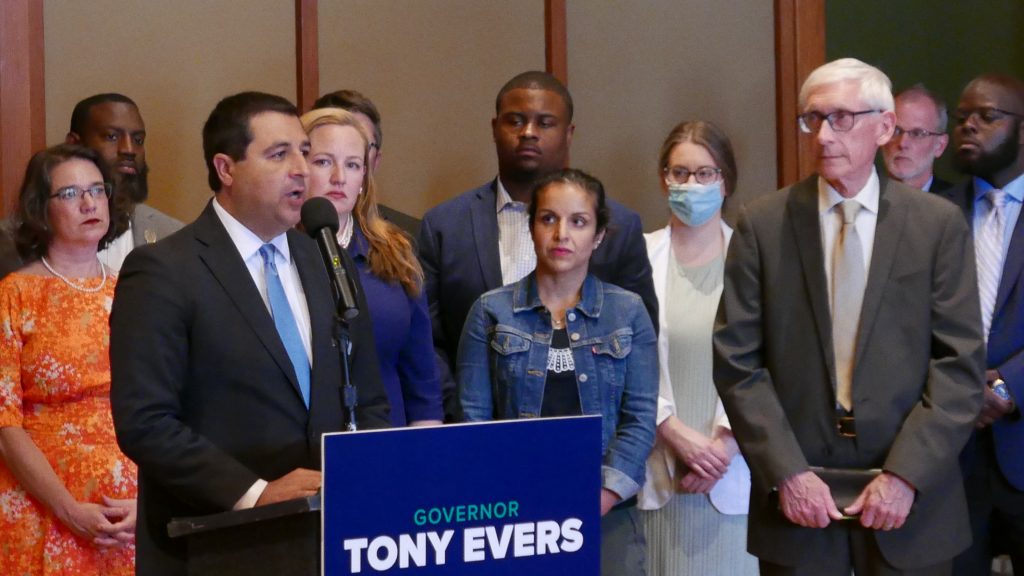Kaul, Evers Sue to Challenge 1849 Abortion Ban
Suit says 1849 law superseded by later laws, names GOP legislative leaders as defendants.

Attorney General Josh Kaul announces he filed a lawsuit challenging Wisconsin’s 1849 abortion ban. Photo by Graham Kilmer.
The Office of Attorney General Josh Kaul has filed a lawsuit challenging Wisconsin’s 19th century abortion ban.
At a press conference Tuesday, Governor Tony Evers announced that he authorized Attorney General Kaul to file a lawsuit in Dane County Circuit Court arguing that the state’s 1849 abortion ban was invalid and cannot be enforced.
Kaul, the State Department of Safety and Professional Services, the Wisconsin Medical Examining Board and Sheldon Wasserman, as Chair of the board, are listed as plaintiffs. State Senator Chris Kapenga, Senate Majority Leader Devin LeMahieu and Assembly Speaker Robin Vos are named as defendants.
It is currently presumed that the state’s abortion ban went into effect after the U.S. Supreme Court released its decision in Dobbs v. Jackson Women’s Health Organization overturning constitutional protections for abortion established by the 1972 decision in Roe v. Wade.
“Our argument is that abortion is legal in Wisconsin right now,” Kaul said. “But obviously a court is going to resolve that question.”
Principally, there are two legal arguments underlying this assertion.
Typically, Kaul said, the “legal rule” followed by courts is that the “statute passed most recently is the one that controls.”
Second, the suit argues that a legal principle called “desuetude” be applied to the matter. This doctrine holds that courts don’t need to enforce laws that have gone unenforced for a long time. The abortion ban “has fallen into disuse and can no longer be enforced under state law,” Kaul said.
Kaul pointed to a 1970 case, three years before Roe v. Wade, that came out of Milwaukee County, Babbitz v. McCann, that led to the decision by the U.S. District Court for the Eastern District of Wisconsin that the state’s abortion law violated individiuals’ rights under the U.S. Constitution
“So for over 50 years abortion rights have been protected in Wisconsin,” he said.
Evers noted that the Republican-controlled state Legislature refused to participate in a special session on proposed abortion legislation prior to the release of the Dobbs decision.
Dr. Kathy King, medical director for Planned Parenthood of Wisconsin, said at the press conference Tuesday that when the Supreme Court’s decision was released, “we were forced to deny people care and turn them away due to the threat of felony criminal prosecution from a vague, ill-defined law from 1849.”
King said the end of protections found under Roe will worsen the U.S. maternal mortality rate. “A study published in the Journal of Demography in October 2021… found that banning abortion nationwide would increase U.S. maternal mortality by 21% overall and 33% if you are Black,” she said.
Dr. Kristin Lyerly, an OB/GYN based in Green Bay, offered another reason why the 1849 law is unworkable. It only allows abortion if the life of the mother is at risk and three doctors sign a statement to that effect. “Imagine this scenario, you’re in Eagle River Wisconsin,” Lyerly notes. “A woman is brought to the emergency department at 2 a.m. on a Sunday morning. She’s diagnosed with an ectopic pregnancy, that’s a pregnancy outside of the uterus, this is the number one cause of death in women in early pregnancy. It’s a common condition. But tell me, where in Eagle River are you going to find two other qualified physicians to evaluate this patient at this time, in this city.”
Lyerly said the state’s ban will not stop abortions from taking place, but it will cause suffering and death.
More about the Overturning of Roe v. Wade
- Three Years After the Dobbs Decision, Wisconsin Republicans are Still Trying to Ban Reproductive Freedom - Democratic Party of Wisconsin - Jun 24th, 2025
- On 3rd Anniversary of Roe Being Overturned, Baldwin, Blumenthal, and Murray Lead Senate Dems in a Bill to Restore Abortion Access Nationwide - U.S. Sen. Tammy Baldwin - Jun 24th, 2025
- Support for Abortion Rights Remains Strong in Wisconsin on Third Anniversary of MAGA U.S. Supreme Court Justices Overturning Roe v. Wade - A Better Wisconsin Together - Jun 24th, 2025
- MAGA Wisconsin GOP Pushed to Restrict IVF Access, Reproductive Freedom - Democratic Party of Wisconsin - Feb 27th, 2024
- Families Are Losing Access to IVF Because of Donald Trump - Democratic Party of Wisconsin - Feb 23rd, 2024
- Planned Parenthood Seeks Wisconsin Supreme Court Ruling On Abortion - Hope Kirwan - Feb 22nd, 2024
- PPWI Asks Wisconsin Supreme Court to Protect Abortion Rights - Planned Parenthood of Wisconsin - Feb 22nd, 2024
- Wisconsin Democrats on Donald Trump’s National Abortion Ban - Democratic Party of Wisconsin - Feb 16th, 2024
- How Did Dobbs Decision Affect State’s Birth Rate? - Bridgit Bowden - Jan 2nd, 2024
- Gov. Evers Slams Republicans’ New Effort to Restrict Reproductive Healthcare in Wisconsin - Gov. Tony Evers - Dec 21st, 2023
Read more about Overturning of Roe v. Wade here





















